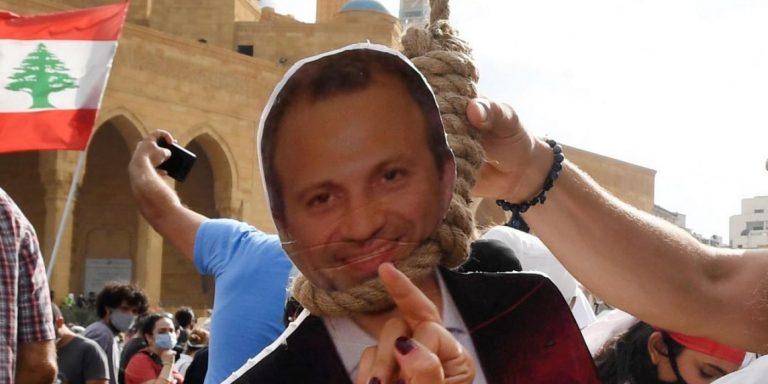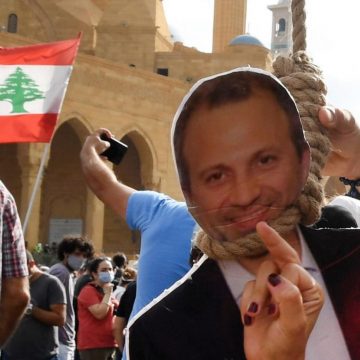The US Treasury recently sanctioned Gebran Bassil, leader of the Free Patriotic Movement party and member of parliament, for his role in corruption in Lebanon, using the Magnitsky Act. This provision is deployed when human rights abuses and corruption reach such scope and gravity that they threaten the stability of international political and economic system.
Unfortunately, as frequently occurs with the US government’s decisions, even the application of this provision is not immune to double standards. In the case of Lebanon, for Washington, corruption is not a problem – provided that you are aligned with US policies.
In this case, however, we are facing a real mystery. According to US Treasury Secretary Steven Mnuchin, Bassil “has helped to erode the foundation of an effective government that serves the Lebanese people”. He noted that this decision “further demonstrates that the United States supports the Lebanese people in their continued calls for reform and accountability”.
Economic mismanagement
The overall US analysis behind this decision is essentially correct. Lebanon has long suffered from endemic corruption and economic mismanagement by its historical power brokers, who have advanced their own interests at the expense of the Lebanese people. Since October 2019, widespread protests with participation from a broad segment of Lebanese society have called for political, social and economic reforms.
All Lebanese governments have failed to curb inflation and mounting debt, as well as to improve the country’s failing infrastructure and to ensure basic services. Socioeconomic conditions for ordinary Lebanese people have continued to deteriorate, while political leaders remain insulated from the crisis.
The US decision remains inexplicable, to say the least. It did not target one of the top people responsible for Lebanon’s chaos
The country is experiencing an energy crisis that leaves people without electricity for hours or even days at a time, and government officials appear unable to fix the problem. The political dysfunction was exemplified by the catastrophic explosion at the Beirut port on 4 August, which many saw as a further example of the negligence and corruption that victimises Lebanese citizens.
Financially, the country has already defaulted, thanks to a Ponzi scheme run for years by its central bank, and ordinary savers have been forced to settle for highly limited access to their bank deposits, bringing many to the brink of starvation.
Yet, while long overdue, the US decision remains inexplicable, to say the least. It did not target one of the top people responsible for Lebanon’s chaos: fourth-time Prime Minister Saad Hariri, who once again returned to power after he was ousted by a popular revolt in October 2019. As though nothing had occurred in recent decades, when Hariri repeatedly served as premier with zero results, he has been supported to assume the role again by the usual power brokers.
Christian parties marginalised
Bassil, the Christian leader who aspires to succeed his father-in-law, Michel Aoun, as the country’s next president, has this time refused to support Hariri’s comeback to power, which had been pushed by some Sunni and Shia parties, including Hezbollah. The second-most important Christian party, the Lebanese Forces, took a similar decision.
It is probably the first time, then, that a Cabinet has been formed in Lebanon without the participation of the main Christian parties – an unprecedented development that took place as major world powers watched idly, especially France, which since the 4 August explosion had taken the lead in attempts to save the country from complete collapse.

After the blast, French President Emmanuel Macron visited Beirut twice. He made specific, sound proposals and asked for clear commitments on reforms, but his appeals went unheeded by the traditional Lebanese power brokers.
While France has always been proud of its strict secular approach to politics, up to the point of creating deep and probably avoidable fissures with its Muslim minority, it has also attributed to itself the historical role of protector of the Christian minorities in the Levant.
It is thus disconcerting how Macron has tolerated the marginalisation of Christian parties in the Lebanese decision-making process, facilitating Hariri’s disgraceful comeback. How is it possible that one of the main enablers of Lebanon’s chaos has again been assigned to rule and reform the country, amid a deafening silence from Paris?
A final disappointment
The US has maintained a similarly questionable position. After mobilising against the country’s endemic corruption and Hezbollah, the Trump administration has not objected to the fact that Hezbollah’s main power-sharing partner in recent decades, Hariri, is again in charge with the support of this same movement – which, incidentally, figures prominently in the US terrorism list, as Washington pushes its European allies to follow suit with a terrorism designation.Beirut explosion: A weapon of mass corruptionRead More »
If the targeting of Bassil really aims to show that the US “supports the Lebanese people in their continued calls for reform and accountability,” then why – considering his abysmal record – has Hariri not been sanctioned as well? If the primary US concern is the struggle against corruption, why it has decided, again, to go after a relatively small fish like Bassil instead of the bigger fish, such as Hariri, Speaker Nabih Berri or veteran politician Walid Jumblatt?
Even on its way out, the Trump administration never misses an opportunity to surprise. The sad news is that this time, in serving one of its last disappointments, it is in good company with the French presidency.


